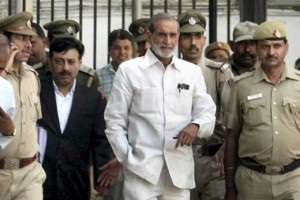Sikh Genocide 1984
Sultanpuri Massacre 1984: Delhi High court reserves decision on plea of Sajjan Kumar
May 25, 2013 | By Sikh Siyasat Bureau
New Delhi, India (May 25, 2013): It is learnt that the Delhi High Court on May 24, 2013 reserved its verdict on Indian politician Sajjan Kumar’s plea challenging a trial court’s order to frame charges against him in Sultanpuri Massacre case 1984. Sultanpuri Massacre was part of wider plan of Sikh genocide 1984, and the case against Sajjan Kumar relates to the killing of six people in Sultanpuri area in Delhi.

Sajjan Kumar – Indian politician who is facing murder charges in an incident related to Sikh Genocide 1984
As per information Justice Suresh Kait of Delhi High Court reserved the order after hearing the concerned parties in this case. The high court, which was to pronounce its order on April 29 had deferred it saying that further hearing was required in the case and on April 30, 2013 a Delhi trial court dramatically acquitted Sajjan Kumar in Delhi Cantonment area massacre case.
Sajjan Kumar, a politician related to Congress (I) party of India, did not face arrest for his role in various massacres in Delhi that were carried in November 1984. He has enjoyed state patronage and was able to evade trials or convictions during last more than 28 years.
In the Sultanpuri Massacre case Sajjan Kumar had contested the trial court order, which in July 2010 framed charges against five accused, including him, for the murder of six Sikhs in Sultanpuri area after the assassination of then Indian prime minister Indira Gandhi October 31, 1984.
The counsel for Sajjan Kumar reportedly opposed the conspiracy charge saying that no witnesses had alleged Sajjan Kumar had conspired with others in the commission of offence.
However, senior advocate H. S. Phoolka, who pleaded for victim Sheela Kaur, said that there was ample evidence against the accused for the charge under 120B (conspiracy) of the IPC to be framed against them.
“All the accused were in conspiracy with each other to attack and kill the Sikhs”, he reportedly told the court.
“Sajjan Kumar started his speech instigating the mob of about 300-400 persons on the morning of November 1, 1984 to kill the people of Sikh community as Sikhs had killed Smt Indira Gandhi and to loot and burn their houses” H. S. Phoolka said referring to the charge sheet.
The charge of conspiracy was made out as the accused Sajjan Kumar had made provocative speech and then the mob acted in furtherance of their common design in killing the Sikhs, he said, adding the lower court’s order of not invoking the charge was “illegal”.
CBI, the prosecuting authority, also opposed the order of the lower court and said ample “prima facie” evidence was there to frame conspiracy charge against Sajjan Kumar.
In the Sultanpuri massacre 1984 case, besides Kumar, co-accused Ved Prakash Pial, alias Vedu Pradhan, and Brahmanand Gupta had also moved the high court against framing of charges against them in the case.
It is notable that in July 2010, a trial court had framed charges against Kumar, Brahmanand Gupta, Peru, Khushal Singh and Ved Prakash in this case.
Besides charges of murder and rioting, the court had also framed charges for the offence of spreading enmity between two communities against the accused in the case.
CBI had filed two charge sheets against Kumar and others in January, 2010 in the riots cases registered in 2005 on the recommendation of Justice G T Nanavati Commission which probed the sequence of events leading to the riots.
It is notable that “genocide” as such does not form any specific crime in India and the accused are charged just under normal criminal law for various offences under Indian penal code. In the absence of any law prohibiting and punishing the genocide or crimes against humanity there is no legal mechanism in Indian to determine that whether a particular massacre constituted the crime of genocide/crimes against humanity or not.
To Get Sikh Siyasat News Alerts via WhatsApp:
(1) Save Our WhatsApp Number 0091-855-606-7689 to your phone contacts; and
(2) Send us Your Name via WhatsApp. Click Here to Send WhatsApp Message Now.
Sikh Siyasat is on Telegram Now. Subscribe to our Telegram Channel
Related Topics: 1984 Sikh Genocide, Delhi High Court, Indian National Congress, Indian State, November 1984, Sajjan Kumar, Sultanpuri Massacre




